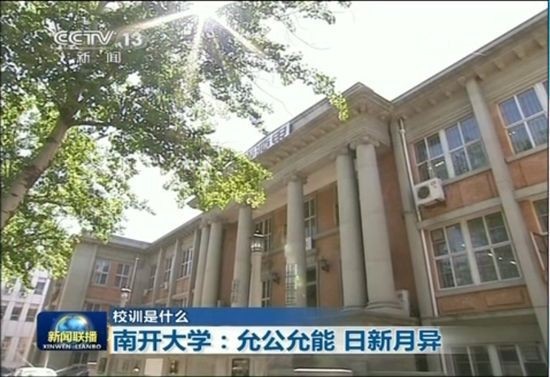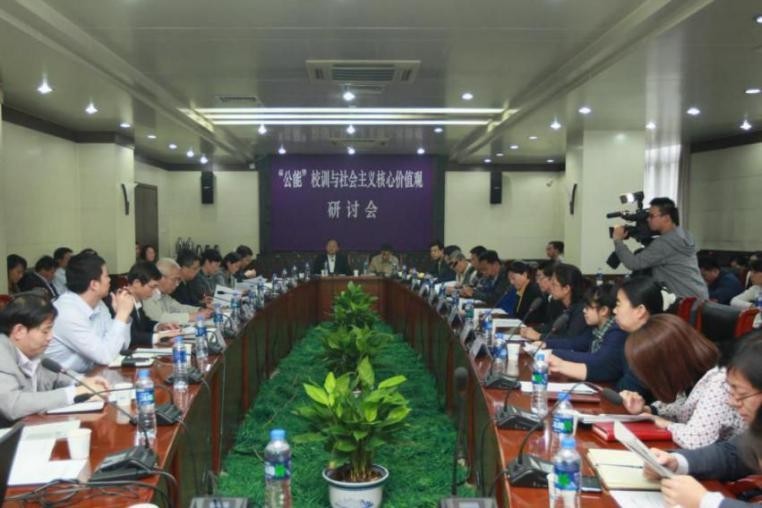Nankai’s character is as her motto required “Dedication to public interests, acquisition of all-round capability, and aspiration for progress with each passing day”. Being the traditional accumulation and core value, the school motto displays the educational philosophy and value pursuit of teachers and students. Meanwhile, it supplies a guideline for running the school and the conduct of faculties and students.

On 9th August.2014, CCTV News Network introduced the school motto of Nankai University in the serial report “What does school motto mean?”
It has been nearly 100 years since Nankai University was established in the May 4th Movement era. During the long-term practice of running the school, students’ deep awareness of the nation and society's interests and the youthful spirit facing the future had been shaped in Nankai University. All of the characters can be summarized by the motto: “Dedication to public interests, acquisition of all-round, capability, and aspiration for progress with each passing day”.
The first president, Zhang Boling explained that “Dedication to public interests” stresses students' contribution to our nation instead of small groups otherwise you devote nothing more than selfish departmentalism”. “Acquisition of all-round capability” requires students to try their best to learn modern science and build China into a modernized country. He also mentioned that “aspiration for progress with each passing day” means not only must we accept new things, but we must also become creators of new things and we have to lead the era in addition to catching up with the new era. His interpretation has practical significance even now.
Meanwhile, it is noteworthy that the school motto as the production of past time needs endowing with the modernistic connotation so as to acquire comparatively longer vitality. For example, in terms of “Five Social Evils” including ignorance, weakness, poverty, disunity and selfishness in the Republic of China period, Zhang Boling highlighted the dedication to public interests so as to expel people’s disunity and selfishness and lead them to concern for the collective. He believed that only the acquisition of all-round capability is promoted, the weakness and poverty of the society can be dislodged. Although the school motto still has a far-reaching significance today, it was a guidance aiming at getting rid of the “Five Social Evils” at that time. After the founding of New China, the overall outlook of the Chinese has changed after more than 60 years of development. Thus the interpretation of the school motto should also keep pace with the times.
After the 18th CPC National Congress proposed the task of cultivating and implementing the core values of socialism based on the “Three Advocacy,” the university began to think about how to find the fit point between the school motto and the socialist core values and how to integrate the newly proposed Three Advocacy into the school motto that has long been rooted in teachers’ and students’ hearts. After the Central Committee’s Opinions on Cultivating and Practicing Core Socialist Values identified the 24 words of “Three Advocacy” as the basic contents of the core values of socialism, the school earnestly studied and decided that if we understand “public interests” as dedication to a strong, democratic, civilized, and harmonious homeland sentiment, pursuit of a social ideal of freedom, equality, justice, and the rule of law, cultivation of patriotism, dedication, honesty, and goodwill, understand “all-round capability” as a self-cultivation, service to the society, and the ability to practice the “public interests” values, and understand “aspiration for progress with each passing day” as in the process of pursuing and implementing “public interests”, we must keep pace with the times and make innovations, then the school motto can be described as the “Nankai expression” of the socialist core values. Finding this fit point, we can use the inheritance, development, and practice of the motto as a vehicle to integrate the core values of socialism into the school-administration practice of Nankai University and the campus life of faculties and students in the new period, so as to make it become the guiding school for administrating schools and standardizing the conduct of teachers and students.
Based on the understandings above, Nankai University actively explores its own traditions and cultural characteristics, using the school motto as a vehicle, and integrating the cultivation and practice of socialist core values into Nankai’s reform and development of education, university spiritual cultivation, and campus culture construction so to make it closer to the reality of our school.

On 17th October, 2014, Nankai University held a seminar on school motto and socialist core values
As the school’s development strategy, the school determined the implementation of quality-oriented education with Nankai characteristics as the basic strategy for running the university, formulated the “Outline for the Implementing of Quality- oriented Education in Nankai University,” focused on training students with morality, ability, comprehensive development and courage to innovate, and strive to make the students and graduates become exemplary models of practicing socialist core values. The university’s motto, which solidified Nankai’s historical traditions and experience in running the school, continues until today. One of the important enlightenments for us is that we must follow the fundamental task of enhancing morality and fostering talents and enforce quality-oriented education seriously. Nankai University has always been paying much attention to the requirements of student's conduct, emphasizing the combination of scientific spirit and humanistic literacy; always paying attention to the teaching of basic knowledge and training of creativity, and hiring outstanding teachers to teach core curriculums; always focusing on “knowing China and serving China” and emphasizing making study serving for the practical purpose and connecting theory with reality; always attaching great importance to sports and aesthetic education and encouraging students to “have a strong body and noble spirit-in order to inherit and promote this tradition of operating a school”.
The university identified the implementation of quality-oriented education as the basic strategy for running the school, formulated the Outline for the Implementation of Quality-oriented Education in Nankai University (2011-2015), and strove to foster patriotic, dedicated, innovative and sociable talents following Zhou Enlai’s example. For the implementation of quality-oriented education, the school proposed promoting the realization of three changes. Firstly, the concept of running a school is transformed from “subject-based” to “student-based” so that students’ development is emphasized. Secondly, educational content changed from “transferring knowledge” to “developing quality”, transcending knowledge education and focusing on all-round development of morality, intelligence, physique, and aesthetics. Thirdly, the training mode is altered from teaching-oriented to study-oriented which makes teaching benefit the teacher as well as students and promotes students' active learning and good interaction between teachers and students.As required by General Secretary Xi Jinping, “working hard on the finer, the smaller and the workable”, the school adapted the “three in one” educational model of classroom teaching, campus culture and social practice in the level of specific operation. Also, the school held a series of solemn rituals and activities such as publicizing the history of the school, singing the school song, reciting the school motto, wearing the school badge, ringing the bell, visiting the Memorial Hall of Zhou Enlai and Deng Yingchao as well as the selection of “Boling Class”, “Zhou Enlai Class”, “Yang Shixian Class” and “Zhou Enlai Scholarship” and so on. By all these activities and rituals, Nankai University equipped every detail of her educational practice with the new connotation of socialist core values represented by the school motto. In the strong but harmonious atmosphere of “Patriotic, Dedicated, Innovative and United”, the new connotation of socialist core values has been internalized as staff and students’ spiritual pursuit to face the new era and externalized as their disciplined actions to accomplish the Chinese dream.
In order to promote the education for all-round development with Naikai characteristics, Nankai University cultivates students with the concept of “Building noble morality, paying attention to capacity and integrated, development, taking risks to innovate” to foster students’ all-round development. Besides, Nankai University made standard system and assessment methods which conform both to the law of student’s growth and the requirement of the school motto. The evaluation system categorized the first point of the school motto “Dedication to Public Interests” into three aspects “ambition, integrity and bosom”. Likely, the “Acquisition of all-round capability” is divided into living, learning innovating, collaborating, and aesthetical abilities. Student self-evaluation, peer review, and counselor review are combined to establish evaluation guidelines and deepen student’s understanding so as to lead them to consciously practice the core values of socialism condensed by the school motto. At present, this work is constantly improving in practice aiming at inspiring the guiding role of the assessment system.
It has been more than 80 years since Nankai University put forward her school motto which not only bears the ideal of saving the country by education of alumni, but also displays faculties and students’ understanding of the national rejuvenation. General Secretary Xi Jinping once pointed out: “As long as the Chinese pursue the noble morality from generation to generation, our nation will always be full of hope”. We firmly believe that the succession and practice of the school motto by Nankai people generation after generation will surely make it possible to realize the Chinese dream and the great rejuvenation of the Chinese nation.









